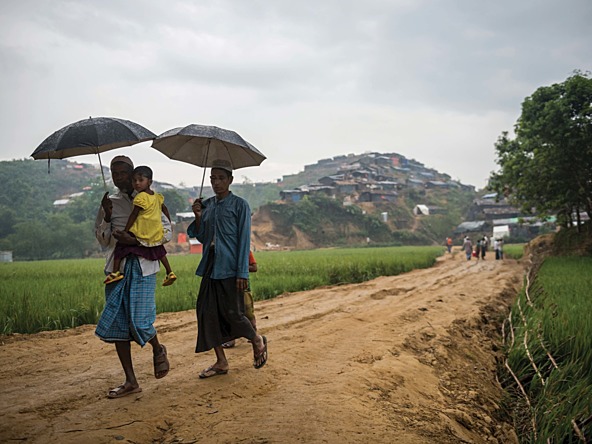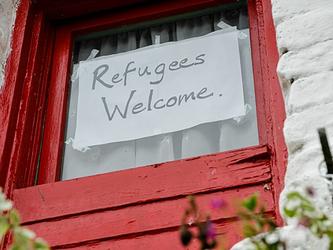Refuge from the storm: Covid-19 and refugees

One of the world’s biggest refugee crises intensified in August 2017, as persecution in Myanmar led to thousands of Rohingya fleeing their homes in Rakhine state. Most settled in refugee camps in Bangladesh, which borders the province. One of the most prominent refugee camps, which is home to 800,000 people, was in Cox’s Bazar.
Fast forward to 2020, and the onset of Covid-19 created substantial concern about the potential for an outbreak sweeping through the camp, potentially killing thousands of inhabitants. The local hospital had 340 beds, and there were concerns that the lack of medical capacity could create crisis conditions.
BBC Media Action was already working with non-profit organisations Internews and Translators without Borders in the camp, on a campaign, started in 2017, to help refugees access information and communicate with humanitarian groups.
When Covid-19 hit, it was vital to disseminate public health information about the virus within the camp. Arif Al Mamun, head of research at BBC Media Action Bangladesh, says: “Humanitarian agencies adapted their communication methods to reach people where they could – working through networks of Rohingya volunteers living in the camps, playing content through loudspeakers at mosques and on moving vehicles, and sharing information at key services that people continued to use, such as food-distribution points.”
The agencies also developed bespoke communication materials for the community to encourage preventative behaviours, such as hand washing and social distancing.
In January 2021, the BBC Media Action team carried out a representative survey to evaluate the campaign with 2,678 people in the Rohingya community based in 15 camps, and 1,050 people from the two districts in which the camps were based. This allowed BBC Media Action to examine whether inhabitants of the camps felt they had enough information. Researchers also did qualitative research to understand where people were accessing information about Covid-19 and what information was deemed engaging, as well as in-depth interviews with humanitarian workers.
The evaluation found that Rohingya were generally better informed about the virus than the wider population. The camps had 348 confirmed cases and 10 deaths because of Covid-19 by 11 November 2020, compared with 5,000 cases and 72 deaths in the wider area.
“While the host community relied on mass media for information about Covid-19, the Rohingya community did not have access to mass media in their own language, so relied more on communication materials made specifically for them – such as audio programmes in Rohingya language and visual materials shared by community health workers,” Al Mamun says. “Without these bespoke communication materials, it is unlikely knowledge about Covid-19 prevention would have been as high.”
The evaluation found that 75% of Rohingya people reported that they had encountered at least five pieces of content from the project during the pandemic. Two-thirds of inhabitants of Cox’s Bazar felt well-informed about Covid-19, and more than 70% could correctly identify the symptoms.
Communication strategies worked best when they were based on a strong understanding of the community. “Content engaged the Rohingya audiences because it was targeted, easy to understand, relatable, in line with their values, and entertaining,” says Al Mamun. “Content would not have reached people without partnerships with relevant organisations based in the community, such as mosques, health facilities and food distribution points.”
When managing refugee camps across the world, these lessons could be vital in helping prevent the spread of disease and protecting people who have already escaped poverty and persecution.
- There are 24.6 million refugees in the world
- More than 742,000 Rohingya have fled to Bangladesh since August 2017
- More than 40% of Rohingya who have fled Myanmar are aged under 12
(Source: UNHCR)

We hope you enjoyed this article.
Research Live is published by MRS.
The Market Research Society (MRS) exists to promote and protect the research sector, showcasing how research delivers impact for businesses and government.
Members of MRS enjoy many benefits including tailoured policy guidance, discounts on training and conferences, and access to member-only content.
For example, there's an archive of winning case studies from over a decade of MRS Awards.
Find out more about the benefits of joining MRS here.













0 Comments